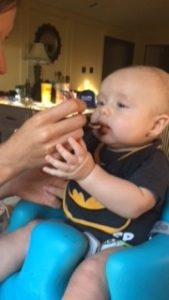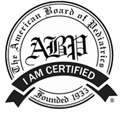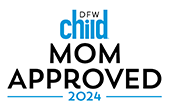 The first feeding: Babies expect a breast or a bottle when hungry. So make sure your baby is happy and awake but NOT hungry the first time you feed him or her solid food because at this point he/she is learning a skill, not eating for nutrition. Wait about an hour after a milk feeding when baby is playful and ready to try something new. Keep a camera nearby because babies make great faces when eating food for the first time. Many parents like to start new foods in the morning so that they have the entire day to make sure it agrees with their baby. Watch for rash or stomach upset.
The first feeding: Babies expect a breast or a bottle when hungry. So make sure your baby is happy and awake but NOT hungry the first time you feed him or her solid food because at this point he/she is learning a skill, not eating for nutrition. Wait about an hour after a milk feeding when baby is playful and ready to try something new. Keep a camera nearby because babies make great faces when eating food for the first time. Many parents like to start new foods in the morning so that they have the entire day to make sure it agrees with their baby. Watch for rash or stomach upset.
Remember:
1) It’s not just about the food. It’s about teaching your child to eat when hungry and to stop when not hungry.
2) Eating a meal with family is social as well as nutritious. Keep eating pleasant and relaxed. Avoid force-feeding or tricking your child into eating. Feed your baby along with other family members so your baby can learn to eat by watching others eat.
3) Babies start out eating pureed foods on a spoon between 4-6 months and progress to finger foods when physically capable, usually between 7-9 months. Teeth are not required; hand to mouth coordination is required.
WHAT should you feed your baby first? There is no one right answer to this question.
- The easiest food to offer is one that is already on the breakfast, lunch, or dinner table that is easy to mush up.
- In some cultures, a baby’s first food is a smash of lentils and rice. In other cultures it’s small bits of hard-boiled egg or a rice porridge. The bottom line: it doesn’t matter much what you start with, as long as it’s nutritious. I fed Cooper prunes for his first food and baby quinoa mixed with breast milk and he liked both!
- Avoid honey before one year of age because honey can cause botulism in infants.
- Add iron-containing food sooner rather than later. Pediatricians recommend a diet with iron-containing solid foods because a baby’s iron needs will eventually outstrip what she stored from her mother before birth as well as what she can get from breast milk or formula. Iron-containing food include iron-fortified baby cereal (such as oatmeal, quinoa, and rice), pureed meats (such as chicken, beef or fish) or smashed lentils or black beans.
- If feeding baby cereals, make them with formula or breast milk, not water or juice, for more nutritional “oomph.”
- Variety is the spice of life: you do not need to feed the same food day after day. In particular, because of concerns of arsenic, avoid over indulgence in rice cereal. No need to avoid certain foods because of the fear of inducing food allergies. It’s ok to introduce nut butters and/or eggs around 4-6 months. This is a change from recommendations issued about 15 years ago. Focus more on avoiding choking hazards than on avoiding theoretically allergenic foods.
- Not all kids like all foods. Don’t worry if your baby hates carrots or bananas. Many other choices are available. Cooper hated avocado, but I’m going to try it again. At the same time, you can offer a previously rejected food multiple times because taste buds change.
HOW to feed:
Sit your baby in a high chair at the table where your family eats meals.
Some babies will learn in just one feeding to swallow without gagging and to open their mouths when they see the spoon coming. Other babies need more time. If your baby becomes upset, end the meal. Some babies take several weeks to catch on to the idea of eating solids. Try one new food at a time. Then, if your baby has a reaction to the food, you’ll know what to blame.
If you prefer to buy “baby food,” know that stage one and stage two baby foods are similar. No need to test all stage one foods before going onto stage two. The consistency of the food is the same. The stages differ in the size of the containers. Some stage two foods combine ingredients. Combinations are fine as long as you know your baby already tolerates each individual ingredient (i.e. “peas and carrots” are fine if she’s already had each one alone). Avoid the dessert foods. Your baby does not need fillers such as cornstarch and concentrated sweets.
Be forewarned: poop changes with solid foods. Usually it gets more firm or has more odor. Food is not always fully digested at this age and thus shows up in the poop. Wait until you see a sweet potato poop!
By six months, babies replace at least one milk feeding with a solid food meal. Many babies are up to three meals a day by 6 months, some are eating one meal per day. Starting at six months, for cup training purposes, you can offer a cup with water at meals. Juice is NOT recommended! Juice contains a lot of sugar and very little nutrition.
Sarah Caudle, PA-C



